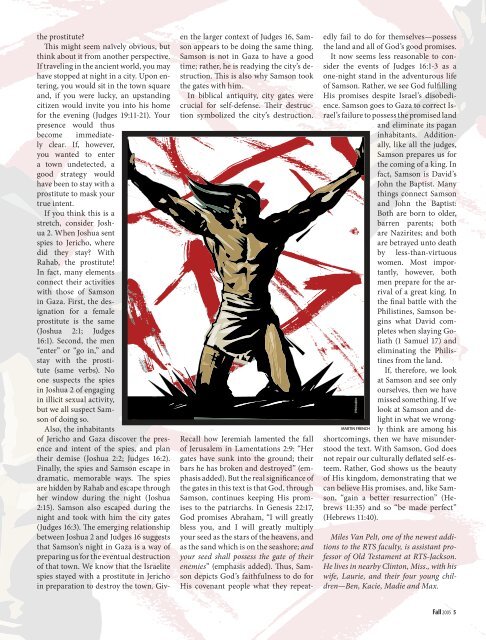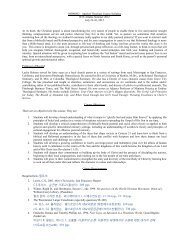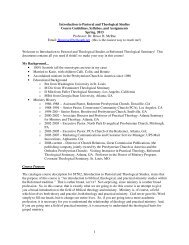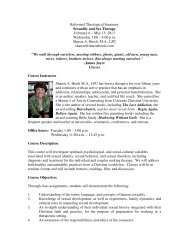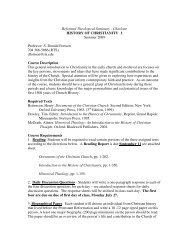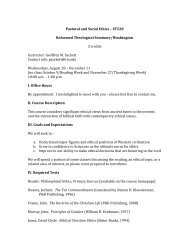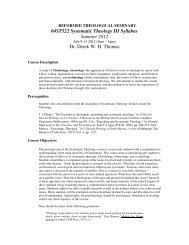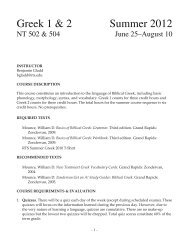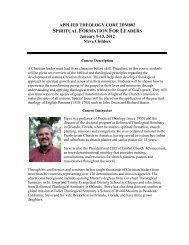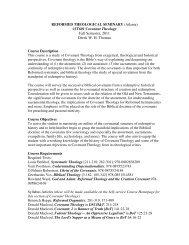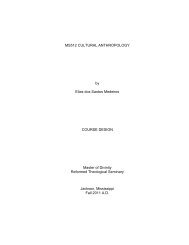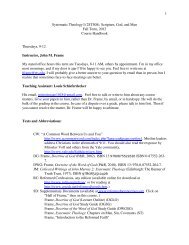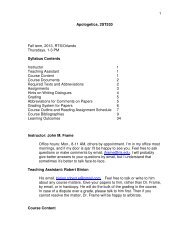URBAN THEOLOGICAL RENEWAL - Reformed Theological Seminary
URBAN THEOLOGICAL RENEWAL - Reformed Theological Seminary
URBAN THEOLOGICAL RENEWAL - Reformed Theological Seminary
Create successful ePaper yourself
Turn your PDF publications into a flip-book with our unique Google optimized e-Paper software.
the prostitute?<br />
This might seem naïvely obvious, but<br />
think about it from another perspective.<br />
If traveling in the ancient world, you may<br />
have stopped at night in a city. Upon entering,<br />
you would sit in the town square<br />
and, if you were lucky, an upstanding<br />
citizen would invite you into his home<br />
for the evening (Judges 19:11-21). Your<br />
presence would thus<br />
become immediately<br />
clear. If, however,<br />
you wanted to enter<br />
a town undetected, a<br />
good strategy would<br />
have been to stay with a<br />
prostitute to mask your<br />
true intent.<br />
If you think this is a<br />
stretch, consider Joshua<br />
2. When Joshua sent<br />
spies to Jericho, where<br />
did they stay? With<br />
Rahab, the prostitute!<br />
In fact, many elements<br />
connect their activities<br />
with those of Samson<br />
in Gaza. First, the designation<br />
for a female<br />
prostitute is the same<br />
(Joshua 2:1; Judges<br />
16:1). Second, the men<br />
“enter” or “go in,” and<br />
stay with the prostitute<br />
(same verbs). No<br />
one suspects the spies<br />
in Joshua 2 of engaging<br />
in illicit sexual activity,<br />
but we all suspect Samson<br />
of doing so.<br />
Also, the inhabitants<br />
of Jericho and Gaza discover the presence<br />
and intent of the spies, and plan<br />
their demise (Joshua 2:2; Judges 16:2).<br />
Finally, the spies and Samson escape in<br />
dramatic, memorable ways. The spies<br />
are hidden by Rahab and escape through<br />
her window during the night (Joshua<br />
2:15). Samson also escaped during the<br />
night and took with him the city gates<br />
(Judges 16:3). The emerging relationship<br />
between Joshua 2 and Judges 16 suggests<br />
that Samson’s night in Gaza is a way of<br />
preparing us for the eventual destruction<br />
of that town. We know that the Israelite<br />
spies stayed with a prostitute in Jericho<br />
in preparation to destroy the town. Given<br />
the larger context of Judges 16, Samson<br />
appears to be doing the same thing.<br />
Samson is not in Gaza to have a good<br />
time; rather, he is readying the city’s destruction.<br />
This is also why Samson took<br />
the gates with him.<br />
In biblical antiquity, city gates were<br />
crucial for self-defense. Their destruction<br />
symbolized the city’s destruction.<br />
Recall how Jeremiah lamented the fall<br />
of Jerusalem in Lamentations 2:9: “Her<br />
gates have sunk into the ground; their<br />
bars he has broken and destroyed” (emphasis<br />
added). But the real significance of<br />
the gates in this text is that God, through<br />
Samson, continues keeping His promises<br />
to the patriarchs. In Genesis 22:17,<br />
God promises Abraham, “I will greatly<br />
bless you, and I will greatly multiply<br />
your seed as the stars of the heavens, and<br />
as the sand which is on the seashore; and<br />
your seed shall possess the gate of their<br />
enemies” (emphasis added). Thus, Samson<br />
depicts God’s faithfulness to do for<br />
His covenant people what they repeatedly<br />
fail to do for themselves—possess<br />
the land and all of God’s good promises.<br />
It now seems less reasonable to consider<br />
the events of Judges 16:1-3 as a<br />
one-night stand in the adventurous life<br />
of Samson. Rather, we see God fulfilling<br />
His promises despite Israel’s disobedience.<br />
Samson goes to Gaza to correct Israel’s<br />
failure to possess the promised land<br />
and eliminate its pagan<br />
inhabitants. Additionally,<br />
like all the judges,<br />
Samson prepares us for<br />
the coming of a king. In<br />
fact, Samson is David’s<br />
John the Baptist. Many<br />
things connect Samson<br />
and John the Baptist:<br />
Both are born to older,<br />
barren parents; both<br />
are Nazirites; and both<br />
are betrayed unto death<br />
MARTIN FRENCH<br />
by less-than-virtuous<br />
women. Most importantly,<br />
however, both<br />
men prepare for the arrival<br />
of a great king. In<br />
the final battle with the<br />
Philistines, Samson begins<br />
what David completes<br />
when slaying Goliath<br />
(1 Samuel 17) and<br />
eliminating the Philistines<br />
from the land.<br />
If, therefore, we look<br />
at Samson and see only<br />
ourselves, then we have<br />
missed something. If we<br />
look at Samson and delight<br />
in what we wrongly<br />
think are among his<br />
shortcomings, then we have misunderstood<br />
the text. With Samson, God does<br />
not repair our culturally deflated self-esteem.<br />
Rather, God shows us the beauty<br />
of His kingdom, demonstrating that we<br />
can believe His promises, and, like Samson,<br />
“gain a better resurrection” (Hebrews<br />
11:35) and so “be made perfect”<br />
(Hebrews 11:40).<br />
Miles Van Pelt, one of the newest additions<br />
to the RTS faculty, is assistant professor<br />
of Old Testament at RTS-Jackson.<br />
He lives in nearby Clinton, Miss., with his<br />
wife, Laurie, and their four young children—Ben,<br />
Kacie, Madie and Max.<br />
Fall 2005 5


